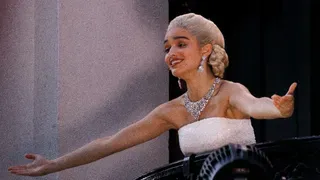September 20, 2019
Blue Stockings
Christine Malcom READ TIME: 6 MIN.
For its 2019–2020 season, Promethean Theatre Ensemble (PTE) explores the status of women throughout history and within imagined societies, beginning with "Blue Stockings", the 2013 debut play from Jessica Swale, which drew her an Evening Standard Most Promising Playwright nomination. In one of the Den Theatre's intimate second floor spaces, and under the direction of Spencer Davis, PTE presents an compelling story with plenty of contemporary resonance.
The play is set in 1896 at Girton College. Established in 1869 as one of the first residential women's colleges in England, Girton students were associated with, but pointedly not part of of Cambridge University, as they were barred from the traditional "Tripos" examinations, and thus from graduation or an actual degree.
Swale's play, for the most part, deftly blends the personal with the political by following the lives of four women with disparate experiences and ambitions, all of whom are pursuing courses of study in science at exactly the moment a coalition of progressives strives to put to a vote in the Cambridge Senate the issue of whether the women of Girton deserve the same formal credentials at the end of their studies as their male peers.
Where the play stumbles occasionally is, perhaps, in espousing an "equal time" approach to the experiences of the young men and women. The four Girton undergraduates, as well as the three women a generation before them – the college's mistress, an inspiring moral philosophy professor, and a chaperone – all have stories one wants to hear far more about, and the time spent with the men at Trinity doesn't pay enough to compensate for the loss on that end.
It's to the credit of the director and cast, that the audience feels as if everyone involved with the production has thoroughly explored those stories. The text itself, unfortunately, occasionally bogs us down with extended scenes of their male counterparts drinking, gambling, and trying to find meaning on top of every privilege they already enjoy.
Specific to PET's production, set designer Therese Ritchie has a challenging space to work with. With the audience set gallery-style on risers, Ritchie manages to convey how aggressively guarded the spaces the women occupied would have been with little more than standard black stage curtains and a few staggered flats painted to suggest bookshelves at one end, and a chalkboard providing a semblance of another "wing" area at the other.
Ritchie also wisely keeps the moveable set pieces to a few benches, a table, and a couple of chairs, and deals with an inconvenient pole in the center of the set by employing it as a part of an orchard the play repeatedly references. Sound designer Tony Ingram ably complements the compact set design with sound effects that stand in for the pleasant mayhem of the students' lives as bicycles and wheelbarrows crash just offstage.
In concert with one another, costume design by Rachel Sypniewski and dialect coach Carrie Hardin ably capture the plays time and place. In contrast to these successes, Clare Sangster's lighting design, is rather static, which complicates some of the difficulties of the space. Davis's direction, fortunately, challenges the boundaries of the space while never losing sight of where he has staged this story.
The opening scene features a famous doctor addressing a lecture hall on the physiological folly of educating women, Davis resists the temptation to have the actor (Jared Dennis, who is excellent in this and the other role he plays) glibly address the audience as though they are the assembled crowd, which would surely have served to play primarily for humor, thus diminishing the impact of such sentiments, which were (and perhaps remaIn) all too real. In the second scene, despite the close confines, Davis manages to make one of the heroines riding a bicycle on stage work, rather than undercutting the high-energy introduction of her heroines that Swale has arranged by omitting it.
Playing the heroines are Heather Kae Smith as Tess, the romantic astronomer-to-be, Elise Marie Davis as Carolyn, who has lived seemingly everywhere under the imperial British sun and who is determined to be a doctor, Julia Rowley as Celia whose scientific ambitions have already been once derailed, and Imani Lyvette as Maeve, whose desire to be a teacher are curtailed by the demands of her impoverished family and the college mistress's perception that Girton must avoid even the slightest hint that educating women will disrupt the social world of home and family.
All four women give strong performances. Davis conveys the bold, oblivious confidence that comes with class privilege in a way that plays well against Lyvette's painfully, pointedly quiet demeanor as the student whose position at the college is the most precarious. Both actors do work that makes one wish the play had delved even further into the class politics of these women, especially as we don't get a strong sense of where Tess and Celia fall along these lines.
Smith's performance as Tess founders during her exams is believable to the point of being harrowing, and it is further strengthened in how it echoes Rowley's earlier confession about her own character's "nervous prostration" the year before.
In the elder generation, Jamie Bragg's restraint through most of the play runs right up to the edge of making her character, college mistress Elizabeth Welsh, restrained to the point that it strains believability; Bragg more than earns this, though, in the two instances where Welsh's composure fails her, once when she reveals her own ardent desire for the vote, though she believes that Girton must avoid all appearance of supporting a radical agenda like suffrage, and near the end when she erupts in fury at the Trinity men who come to harass them as the vote is taking place.
As the chaperone, Miss Bott, Anne Lentino's reserve productively mirrors Bragg's performance, as does her turn as a store owner who eventually loses composure after she must stand idly by as one of the Trinity students harangues Carolyn. As with the work between Smith and Rowley, this echoing emphasizes how women as a collective have a pool of shared experiences such as these.
Cameron Feagin has a tremendous amount of fun with the dramatic, inspiring Miss Blake, the women's moral philosophy professor. Here, too, the performance could have veered into something too eccentric to be believed, but we see Blake at a terribly low moment, when she's been forced to choose between her politics and her profession, and Feagin knocks it out of the park.
Patrick Blashill is also very good as Mr. Banks, the scientist whose teachings inspire students at both Trinity and Girton, and whose commitment to the right of the young women to graduate ultimately sabotages his career. Like Feagin, he keeps on the right side of too good to be true and reveals the depths of his character when Banks is at his lowest.
The young men, by design, are rather indistinguishable from one another, but the actors manage to find the places where individual characters live. Kevin Sheehan is alarmingly appealing as Ralph, so that even though the audience knows Tess's romance will go wrong, we understand why she falls for him. As Will Bennett, Tess's childhood friend Martin Diaz-Valdes plays very well against Smith, so much so that the two managed to smooth out the slight clunkiness of an abruptly introduced love triangle.
Vijay Sarathi occasionally overplays the angry young man a bit as Lloyd, who turns out to be the most vile in his objections to the women's presence within a stone's throw of what he considers to be the exclusive sphere of men. He repeats this tendency as Maeve's brother Billy, though in the actor's defense both scenes are on the too-long side and the writing is quite dramatic.
Revon Yousif plays Edwards (as well as a waiter) with broad humor that skirts the line of too much without crossing. As Holmes, Joshua Servantez manages to convey the character's growth by the end of the play with surprisingly little material.
"Blue Stockings" runs through October 13 at the Den Theatre, 1331 N Milwaukee Ave, Chicago. For tickets, call 773-697-3830 or visit www.thedentheatre.com
Christine Malcom is a Lecturer in Anthropology at Roosevelt University and Adjunct Faculty in Liberal Arts and Visual and Critical Studies at the School of the Art Institute of Chicago. She is a physical anthropologist, theater geek, and all-around pop culture enthusiast.







